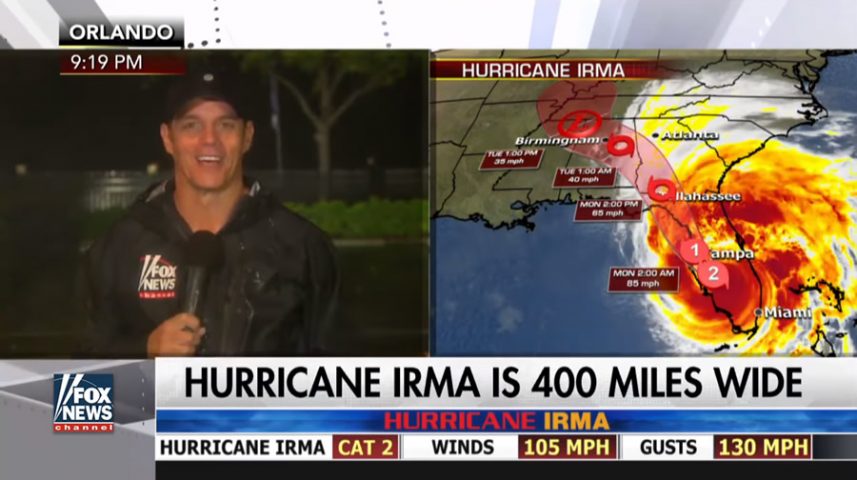The Risk of Hurricane Hype

Soros-Funded Groups Want Dems to Attach DACA to Every Bill
September 14, 2017
Fr. Mitch Pacwa Asks: Are You Ready to Answer Our Lady of Fatima?
September 14, 2017
By Jay W. Richards, Ph.D., Executive Editor of The Stream, Sept. 14, 2017

The onslaughts of Harvey and Irma are mostly behind us. Jose may yet bring trouble. But for now, America can turn to clean up, recovery and reflection.
Here’s a topic for reflection: the risk of hurricane hype.
Hurricanes are one of the climate’s most deadly events, so it’s easy to treat them as one-sided risks. That is, to treat them as if the risk of evacuation is smaller than the risk of staying put.
I’m tempted to make this mistake. During the buildup to monstrous Irma, I felt like Denethor when the armies of Mordor gathered outside the walls of Minas Tirith. I wanted to tell all my south Florida friends: “Flee! Flee for your lives!”
But time, money, attention-span, gas, police and national guard forces are scarce resources. And driving long hours in brutal traffic and bad weather are dangerous. As is getting stuck on the road during a hurricane. One of our Stream colleagues spent over two days just to get from Delray Beach in southeast Florida, to southern Georgia. It was a harrowing experience. And the trip back home was also dreadful.
Like it or not, there are risks in staying put, and risks in evacuating. But hurricane hype leads us to put most or all the risk on one side.
Big News
Running a cost/benefit analysis on mass evacuation doesn’t exactly attract eyeballs at 6:45 pm on a Tuesday night. That’s why TV news gives us doom, gloom and hysteria. The worse it sounds, the more viewers tune in.
The networks, the Weather Channel, FOX and CNN all sent correspondents to the very places officials were telling everyone else to flee. Why? Because we watch it. We want to see Bill Hemmer getting pummeled by wind and water right there on live TV. I track the news online rather than on TV. Still, I couldn’t resist turning on FOX News’ hurricane coverage.
Bad weather events are “cash cows” for TV news. And hurricanes offer days of 24-hour news cycles to rake in the cash. No TV talker wants to tell viewers: “This hurricane looks to be slightly above average for hurricanes over the last century that hit the coastal U.S. It could be a disaster. Then again, maybe not. Now let’s look at the risks of evacuating. …”
Politics
Then there’s the fear of government officials. Do you wanna be the guy who makes the call not to evacuate a major urban area that becomes a death zone? Remember Katrina? Every elected official in the south and southeast does. They also know that many people treat the response to hurricanes as a one-sided risk.
Climate Change
Then there’s the shameless desire of climate change chicken littles who claim this or that storm is the biggest baddest storm ever recorded by man. They told us so. Trump should have listened and signed the Paris accord. Because then … well, nothing different would have happened. But still, who can pass up a chance to blame Trump for a hurricane?
By this point, anyone susceptible to climate hype already agrees. Everyone else can see that if a decade without big hurricanesthat no one predicted is mere weather and not climate change, then one bad hurricane season can’t be proof of man-made climate change. That’s logic, not science. And on the science, there’s no trend toward more frequent or more powerful hurricanes. One bad season isn’t a trend.
Uncertainty
Add to this the simple fact of uncertainty. The casual TV viewer expected Miami to get historic winds and flooding. Instead Naples ended up in the bullseye, on Florida’s west coast. That’s where many Miamians had evacuated to. And rather than an historic flood surge, some places saw ocean waters recede from their coastlines.
Of course, it’s amazing that scientists can predict the path and timing of hurricanes at all! We knew for days that Irma would probably hit Florida on Sunday. Thank God and the hard work of scientists that we knew so much. Compare that to, well, every other time in history, when hurricanes just happened and killed lots of people. (That’s still the story for many poor countries in the Caribbean.) Honest experts admit uncertainty, and update as soon as they have new data. But that nuance disappears in news coverage. Especially TV news, which is all about visuals.
The Danger With Hype
So the media, government officials, pundits, and even some scientists tend to hype every hurricane. That leads some people to do things, such as evacuate, that put them in greater danger.
The long-term result of hurricane hype could be even worse. If people get the sense that the authorities are exaggerating the threat for ratings or political gain, they might ignore future warnings. And that could lead to tragedy. After all, sometimes you really should board up your windows or flee the likely path of a coming hurricane.
That’s why everyone involved should do their best to speak the truth and admit uncertainty. The long-term costs to human life far exceed the short terms benefits of hurricane hype.
________________________




